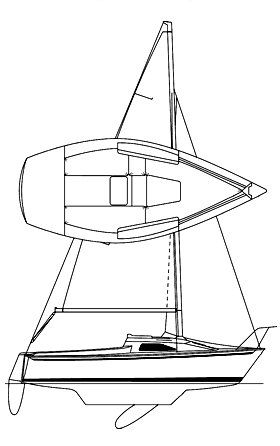The Precision 18 is a highly regarded trailerable sailboat, designed to offer an accessible and enjoyable sailing experience for day-sailors and those seeking light cruising capabilities. It successfully blends simplicity with robust construction, carving out a reputation as a well-mannered and practical vessel. Conceived by world-class yacht designer Jim Taylor, the Precision 18 was built by Precision Boat Works, a family-owned company known for its commitment to quality and value in the trailerable sailboat market.
Precision 18 Information, Review, Specs

- Make
- Precision
- Model
- 18
- Number Built
- 500
- Production Year(s)
- 1984 - 2019
The Precision 18 was first introduced in 1984 and remained in production until 2019, reflecting its enduring popularity and the consistent demand for its design. Designer Jim Taylor envisioned the Precision 18 as the smallest boat that could practically be cruised while remaining easily trailerable by a relatively small vehicle. This design philosophy, prioritizing "Small, Fast, and Fun," was a cornerstone for all Precision sailboats, emphasizing excellent balance and sailing characteristics. Precision Boat Works, founded by brothers Bill and Richard Porter in 1978, prided itself on "quality built in" and specializing in fiberglass trailerable sailboats. Their manufacturing ethos during the Precision 18's production run centered on creating professional, durable designs that provided enjoyable sailing experiences for families.
The boat's design incorporates a long, shallow keel, which contributes to its steady motion and helps prevent turbulence. It also features a kick-up rudder, a common element for trailerable boats to facilitate shallow water access and launching. While no significant variations like MkI or MkII were prominently noted, the core design remained consistent, focusing on its intended purpose as a versatile and manageable sailboat.
Sailing Performance and Handling
Despite its compact size, the Precision 18 is known for its lively and well-mannered sailing performance, offering excellent balance and handling characteristics. It is described as easy to rig and suitable for single-handed sailing, making it an attractive option for casual outings. The boat exhibits superb light-air performance, attributed to its favorable sail area to displacement ratio. Owners report that the Precision 18 can handle moderate winds, with some noting comfortable sailing even in 10-12 knot winds with a reef. Its design, including a long shallow keel and kick-up rudder, contributes to its stability and ease of handling in varying sea states. While some owners might consider it "not much more than a ballasted dinghy," it is widely regarded as a "great little boat" for frequent lake sailing and in typical conditions without excessive pounding. The boat is also self-righting and easy to tack.
Accommodations and Layout
The interior of the Precision 18 is designed with a "cruising interior" in mind, though it is not intended to be a "floating vacation home." The cabin is characterized as open and airy, enhanced by a large companionway and four opening cabin windows that allow for significant light and ventilation. A forward hatch provides additional ventilation and serves as an emergency exit.
The typical layout includes a V-berth forward, often with removable cushions, and two quarter berths located on the port and starboard sides. The maximum headroom within the cabin is 44 inches. Construction utilizes hand-laid fiberglass for both the hull and deck, incorporating a structural molded liner. While basic, the interior provides functional space for overnight stays, fulfilling its role as a "sail camper" for those who appreciate minimalistic cruising.
Owner's Perspectives
Owners of the Precision 18 frequently praise its solid construction and its straightforward, enjoyable sailing characteristics. The boat's ease of rigging and single-handed operation are consistently highlighted as major strengths. Its ability to perform well in light winds is also a recurring positive comment. The trailerable nature of the Precision 18 is a significant advantage, allowing for easy transport and access to various waterways.
However, some owners have noted common maintenance points, such as the potential for the original battery locker to develop leaks, suggesting a need for re-sealing. The compact nature of the cockpit means that sailing with a bimini is generally not feasible. Despite these minor considerations, the Precision 18 maintains a loyal following, with owners appreciating its reliability, robust build, and the overall fun it provides as an easily manageable and capable sailboat.
Measurements
Construction & Hull
- Construction Material
- Fiberglass (Solid)
- Hull Type
- Monohull Sailboat
- Keel Type
- Centerboard
- Rudder
- 1x —
- Ballast
- 350 lbs (Lead)
- Displacement
- 1100 lbs
- Water Capacity
- -
- Fuel Capacity
- -
Engine
- Engine Make
- —
- Engine Model
- —
- Engine Type
- —
- Engine HP
- —
- Engine Count
- 1
- Drive Type
- —
- Fuel Type
- —
Rig & Sails
- Rig Type
- Fractional Sloop
- P (Main Luff)
- 20 ft
- E (Main Foot)
- 8.25 ft
- I (Foretriangle Height)
- 19 ft
- J (Foretriangle Base)
- 5.5 ft
- Forestay Length (est)
- 19.78 ft
- Main Sail Area
- 82.5 sqft
- Foretriangle Sail Area
- 52.25 sqft
- Total Sail Area (Reported)
- 145 sqft
- Total Sail Area (Calc)
- 134.75 sqft
Dimensions
- LOA
- 17.42 ft
- LWL
- 15.42 ft
- Beam
- 7.42 ft
- Draft
- 4.25 ft
- Max Headroom
- -
- Air Draft
- 27 ft
Calculations
- Hull Speed
- 5.26 kn
- Pounds per Inch Immersion
- 408.82